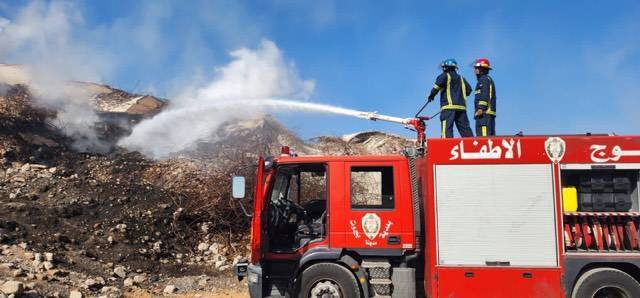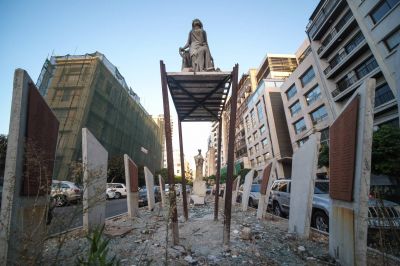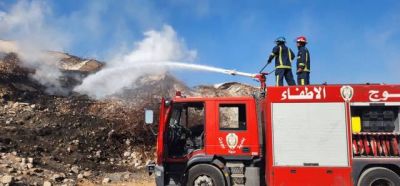
Firefighters work to cool the port silos. (Courtesy of the Environment Ministry)
BEIRUT — For several months, Beirut residents have been smelling a foul odor from grain silos damaged by the Aug. 4, 2020 port explosion. Analyses indicate the pollutants in the air are a danger to public health.
The cooling process of the silos resumed on Oct. 4 after a month-long pause. The Beirut Fire Brigade began to distinguish the recent fire — allegedly caused by fermenting corn left in the northern part of the collapsed silo — in coordination with the Ministry of the Environment. The fire started in the grain silos in early summer, causing, a few weeks later, the collapse of the entire northern block.
Cooling efforts were undertaken for five days in late August and a contracting company began to break up and clear away the rubble of the northern silos, under the supervision of the Ministry of Public Works.
But on Sept. 3, air quality tests conducted inside the compartments where the operators were working revealed pollution emanating from the site. For safety reasons, all work was stopped. Since then, the Ministry of the Environment, with the help of Parliament, has been seeking funding from private organizations to find a solution to the problem.
Contacted by L’Orient-Le Jour, the independent MP and environmental specialist Najat Saliba said fires cause the spread of toxic substances such as nitrogen dioxide, carbon dioxide, nitrogen dioxide, sulfur dioxide, as well as polycyclic aromatic hydrocarbons formed by combustion.
She also pointed out that incomplete combustion of grains can cause the formation of carbon monoxide, which, combined with a high rate of fine particle emissions, can pose a significant threat to the respiratory system.
“Putting out fires is urgent because long-term exposure can lead to illness and respiratory difficulties, especially among the most vulnerable, such as newborns or the elderly,” Saliba said.
The MP established an ad-hoc committee to lobby the Environment Ministry to take action to extinguish the fires and remove debris, grain and fungi.
The presence of fungi and other bacteria resulting from the fermentation of the grain is of greater concern to the Ministry of Environment.
“The smell people are smelling is from the fermentation of low toxic gas,” said Mohammad Abiad, an advisor to the ministry. “Most of the time, the wind blows toward the sea. We took measures and nothing alarming has been reported in this respect. The generators have a much more harmful effect on air quality.”
Funding for an effective fungicide
A Sept. 20 report from the American University of Beirut Medical Center establishes the severity of pollution from the spread of fungi in the air. “Originally, these bacteria are present in nature, however, their presence in such high quantities poses a potential threat to public health. Immediate measures must be implemented before the onset of rains that will provide the bacteria with a better atmosphere to proliferate.”
Faced with this threat, various academic organizations working with the Ministry of the Environment were able to quickly identify an effective, environment and public health-friendly fungicide available at a local supplier.
But there is a financial barrier. In order to purchase the $30,000 product, Lebanese Forces MP Ghassan Hasbani launched a fundraising initiative, coordinating between parliamentarians and organizations to collect donations.
“Fungi and other bacteria are a health risk, even when they are not burned,” The MP told L’Orient-Le Jour. “The works to clear the rubble from the northern part of the site — the most damaged by the explosion — will continue for five to six weeks. But all of this will stay at the port because so far, no outside site to which the rubble and grain could be transferred has been identified.”
According to Abiad, the fungicide was scheduled to be sprayed Friday, Oct. 7, but Hasbani said the date will likely be extended “because we need to find clean water in order to dissolve the product, as seawater is full of bacteria.”
The southern part of the silos, whose foundations were not affected by the explosion and which contains nearly 3,000 tons of wheat grains that are fermenting more slowly, should also be the subject to future studies. One such study, commissioned by the government, is to be carried out by Khatib and Alami consultancy.
“We hope that the survey begins soon, to ensure the stability of the building and the possibility of saving it, as our goal is to make it a monument testifying to the Aug. 4 port explosion,” said Saliba.
This article was originally published in French in L'Orient-Le Jour. Translation by Joelle El Khoury.

